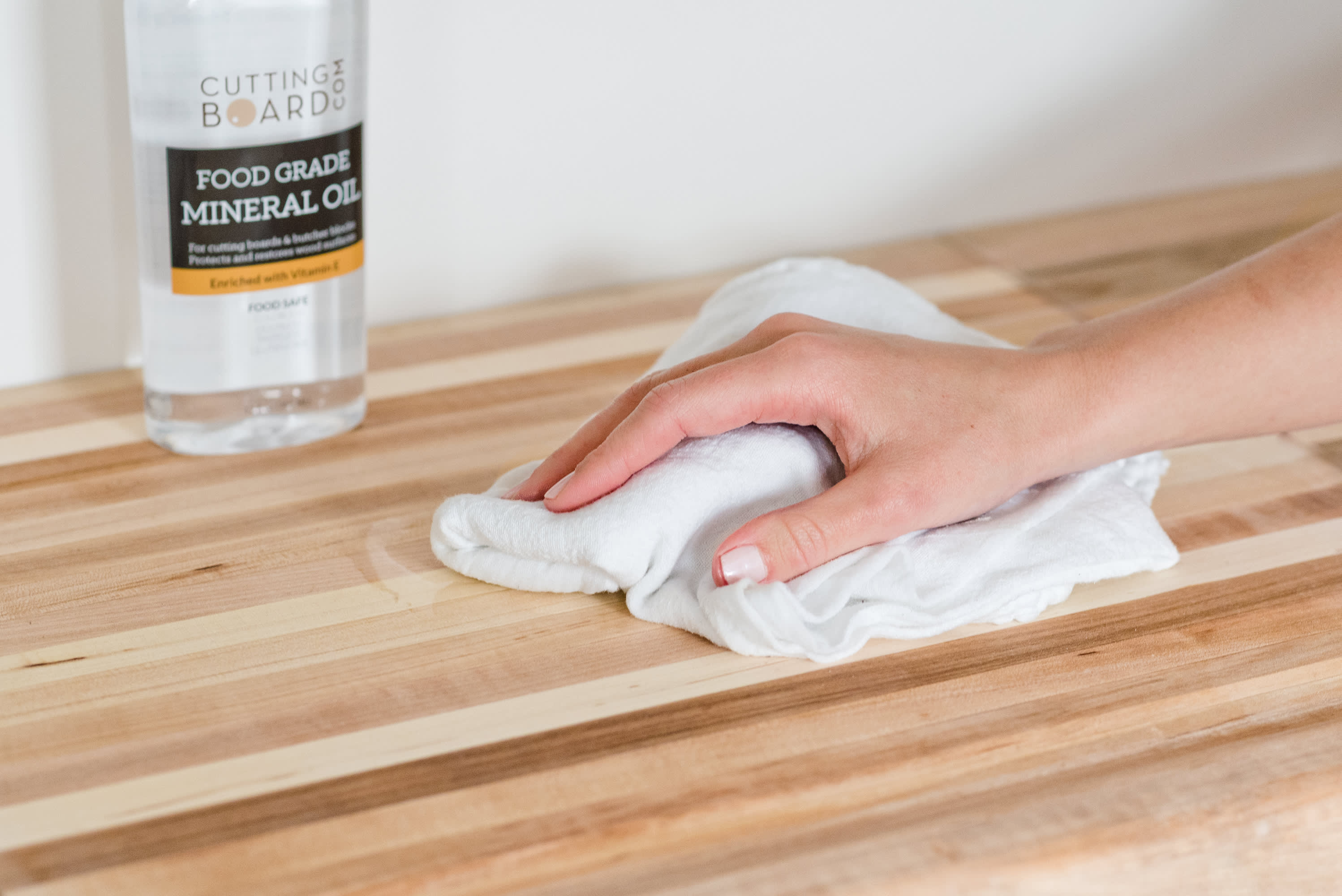Butcher block countertops have a unique warmth and natural aesthetic that sets them apart from other types of countertops. One of the keys to maintaining their beauty and durability is using mineral oil. I’ve always loved the look and feel of butcher block, but it wasn’t until I started caring for it myself that I realized how crucial regular maintenance is to its longevity. Applying mineral oil is one of the easiest and most effective ways to keep the wood from drying out, warping, or cracking over time. The oil seeps into the wood, hydrating it from within, and gives the countertop a rich, glossy finish that enhances its natural grain.
When I first started using mineral oil on my butcher block countertops, I was surprised at how simple the process was. It’s as straightforward as applying the oil to the surface, letting it soak in, and wiping away any excess. But even though the process is simple, consistency is key. Butcher block is a living material, and just like our skin, it can dry out if not regularly moisturized. I make it a habit to reapply mineral oil every month or so, especially in the winter months when indoor heating can dry the air and, consequently, the wood. It’s a small time investment for the benefits it brings in terms of protection and longevity.
Another thing I learned is that not all oils are suitable for butcher block countertops. You might be tempted to use olive oil or vegetable oil, but those can turn rancid over time, leading to unpleasant smells and even bacterial growth. That’s why mineral oil is such a popular choice—it’s food-safe, odorless, and won’t spoil. The fact that it’s so readily available and affordable makes it an easy go-to for anyone with butcher block countertops. You can find it in most home improvement stores, often labeled as “butcher block conditioner” or “food-grade mineral oil.”
I’ve also found that regular oiling not only keeps the wood hydrated but also helps to build up a natural resistance to stains and water damage. Water is one of the main enemies of butcher block countertops. If left standing, it can seep into the wood fibers and cause them to expand, which leads to warping and cracking. By regularly oiling the countertop, I’ve created a kind of barrier that repels moisture. It won’t make the wood entirely waterproof, but it significantly improves its resilience to everyday spills and kitchen messes.
Over time, I’ve learned that the frequency of oiling depends on how often you use your countertops. If your butcher block gets a lot of daily use, like mine does, you may need to oil it more often. On the other hand, if it’s more for show and doesn’t get exposed to frequent spills or knife cuts, you can get away with oiling it less frequently. I like to perform a simple water test every few months to see if it’s time for a re-oil. If water beads up on the surface, the wood is still well-protected. If it soaks in quickly, it’s a sign that the countertop is thirsty and could use another coat of mineral oil.
Beyond the functional benefits, I also appreciate how oiling the countertop revives its appearance. After several weeks of use, especially in high-traffic areas, the wood can start to look dull and dry. A fresh coat of mineral oil restores that beautiful luster, making the wood look vibrant again. It’s a satisfying process because the results are immediate, and there’s something very fulfilling about taking care of a natural material that continues to evolve with time.
One of the most common questions I hear from people is whether mineral oil will change the color of the wood. In my experience, it does slightly darken the wood, but in a way that enhances its natural grain and beauty. The change is subtle and worth it for the added protection and sheen. Over time, as you continue to oil the countertop, it will develop a patina that gives it even more character. I’ve come to appreciate how my butcher block countertops have aged, becoming more beautiful with each application of oil.
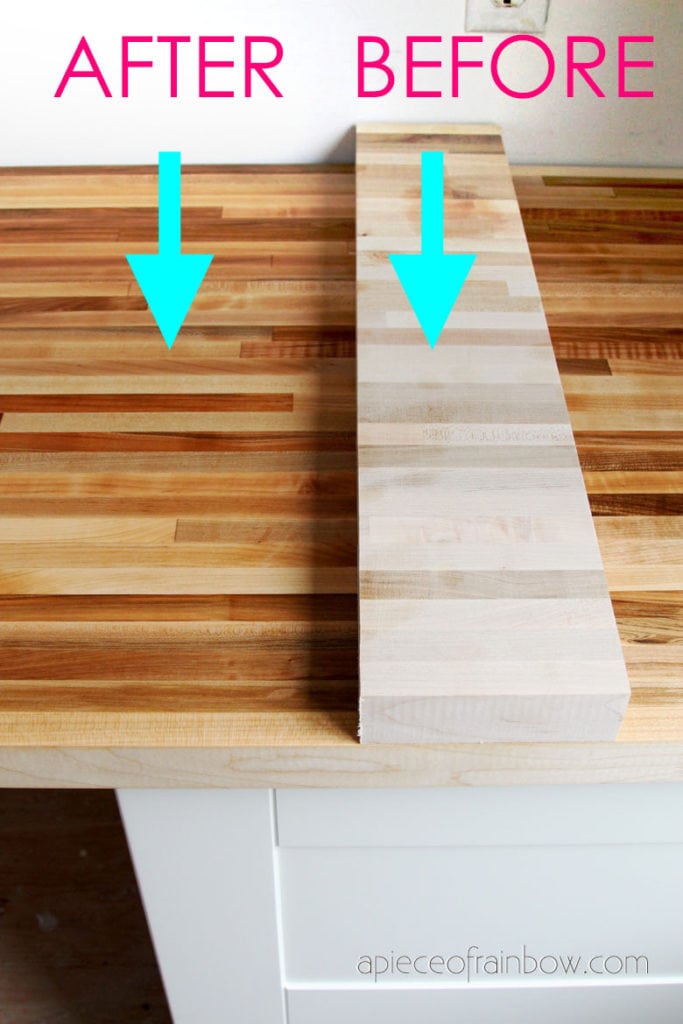
Another thing I’ve come to realize is that mineral oil not only helps protect the countertop but also makes it easier to clean. When the wood is well-oiled, spills and food particles are less likely to stick to the surface. They wipe away easily with a damp cloth. This has been especially helpful in a busy kitchen, where messes happen frequently. I also avoid using harsh chemical cleaners on the wood, as they can strip away the oil and dry out the surface. A simple mixture of water and vinegar works wonders for day-to-day cleaning without harming the finish.
I’ve experimented with different types of finishes, but I always come back to mineral oil because of how simple and effective it is. Some people prefer to use a combination of mineral oil and beeswax, which adds an extra layer of protection and gives the wood a slightly more polished look. I’ve tried that approach a few times, especially for special occasions when I want the countertops to look their best, but for everyday use, mineral oil alone does the trick.
In terms of applying the oil, I’ve found that a lint-free cloth works best. I pour a generous amount of oil directly onto the surface and spread it evenly using circular motions. I pay special attention to the edges and any seams, as those areas tend to dry out more quickly. After letting the oil sit for about 20 minutes, I wipe off any excess with a clean cloth. If the wood still feels dry in certain spots, I’ll repeat the process until it’s fully saturated. It’s important not to rush this step because the more thoroughly the oil is absorbed, the better protected the wood will be.
I’ve also noticed that oiling helps minimize knife marks and other surface imperfections. While butcher block countertops are designed to withstand knife use, over time, small nicks and cuts are inevitable. These imperfections are part of the charm of butcher block, but regular oiling helps smooth out the surface and prevent deep gouges. It’s also a good idea to use a cutting board for more heavy-duty chopping to preserve the look of the countertops.
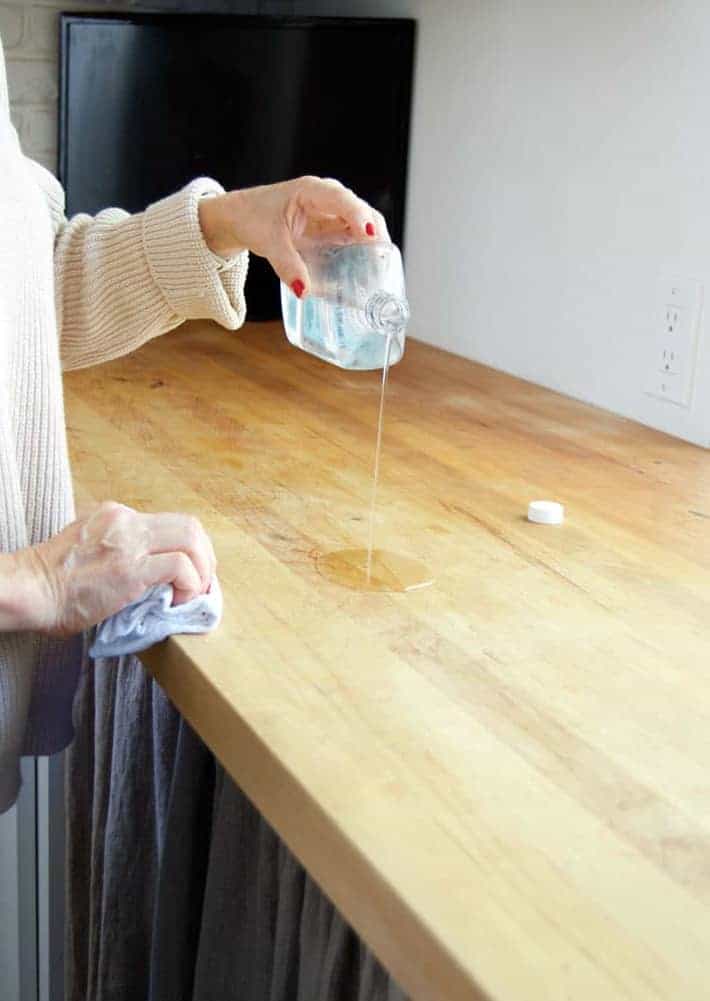
One of the questions I get a lot is whether it’s possible to over-oil butcher block countertops. From my experience, it’s difficult to overdo it. The wood will only absorb as much oil as it needs, and any excess can be easily wiped away. However, it’s important not to let oil sit on the surface for too long, as it can become sticky and attract dust. I always make sure to remove any excess oil after about 20 minutes of soaking time.
I’ve found that mineral oil works best when applied regularly as part of a larger maintenance routine. In addition to oiling, it’s a good idea to sand the surface lightly every year or so to smooth out any rough spots and remove any stains or discoloration. After sanding, I apply a fresh coat of mineral oil to seal the wood and protect it from future wear and tear. This combination of sanding and oiling has kept my butcher block countertops looking great for years.
It’s worth mentioning that while mineral oil is great for maintenance, it won’t repair deep cracks or severe water damage. In those cases, more extensive repairs might be needed, such as filling in cracks with wood filler or replacing sections of the countertop altogether. However, with regular oiling and proper care, these issues can usually be avoided. The key is to be proactive about maintenance rather than waiting until the wood is too damaged to restore.
For anyone considering butcher block countertops, I can’t recommend mineral oil enough as part of your care routine. It’s affordable, easy to use, and incredibly effective at preserving the wood’s natural beauty. The process of oiling the countertop can even be therapeutic in a way—it’s a quiet, simple task that yields immediate results, and there’s something satisfying about keeping the wood looking its best over time.

Common Mistakes to Avoid:
One of the biggest mistakes people make is not oiling the countertop frequently enough. It’s easy to forget, especially if the wood still looks good on the surface, but skipping regular oiling can lead to cracks, warping, and discoloration. Another common mistake is using the wrong type of oil. As tempting as it might be to use something you have in your kitchen pantry, only food-grade mineral oil should be used to avoid issues like rancidity or bacteria growth.
Finally, some people apply too much oil and fail to wipe off the excess, leaving a sticky residue that attracts dirt and dust. Always wipe down the countertop after letting the oil absorb to prevent this.
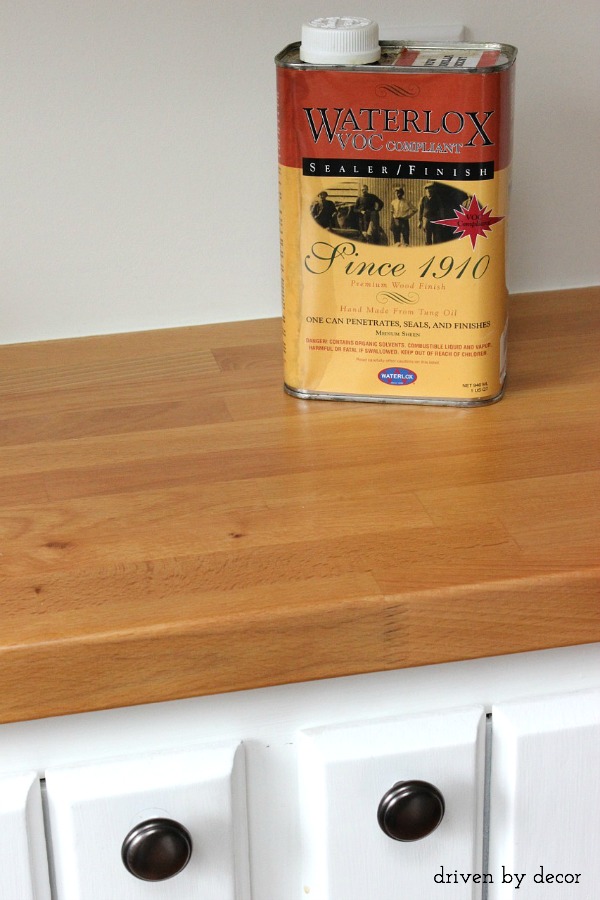
How often should I oil my butcher block countertops?
I recommend oiling your butcher block countertops about once a month, or more frequently if they are heavily used. The wood can dry out quickly in dry climates or during winter, so it’s a good idea to check the surface regularly. If water doesn’t bead up on the surface, it’s time for another oiling.
What type of oil should I use on butcher block countertops?
Food-grade mineral oil is the best choice for butcher block countertops because it’s odorless, non-toxic, and won’t go rancid over time. Other oils, like vegetable or olive oil, can spoil and should not be used. You can find mineral oil labeled as “butcher block conditioner” in most stores.
Can I over-oil my butcher block countertops?
It’s hard to over-oil your countertops because the wood will only absorb what it needs. However, you should avoid leaving excess oil on the surface for too long, as it can become sticky and attract dust. Wipe away any excess oil after about 20 minutes to ensure a smooth, clean finish.
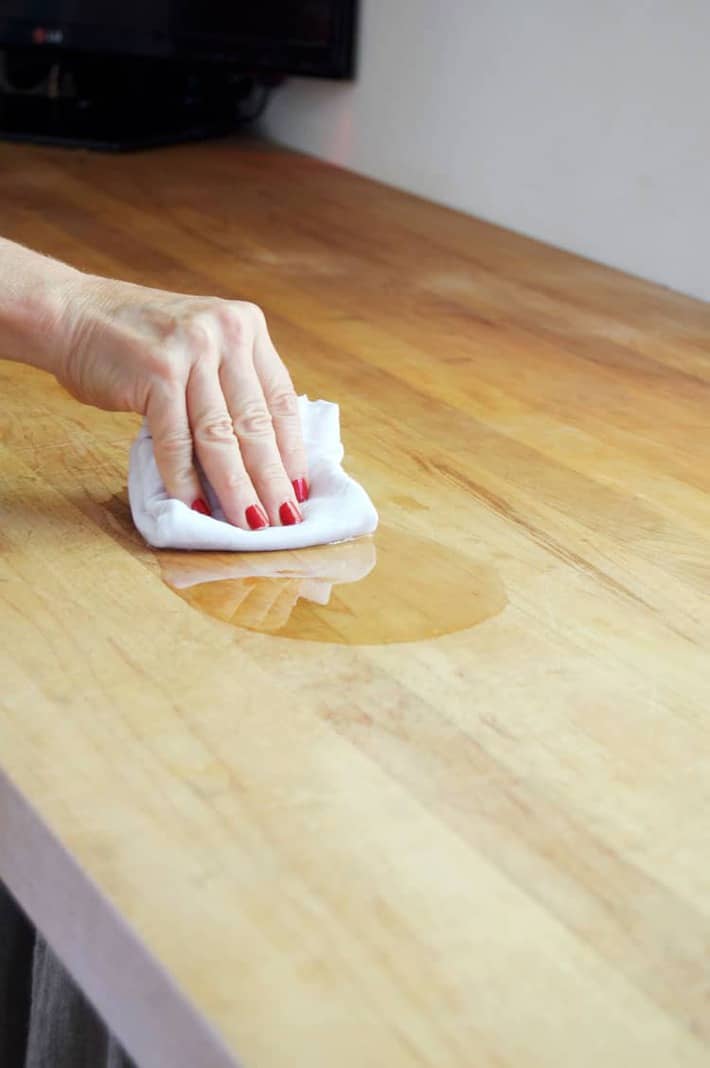
Will mineral oil change the color of my butcher block countertops?
Mineral oil will slightly darken the wood, but it enhances the natural grain and gives the countertop a richer, deeper tone. Over time, the oil will help the wood develop a beautiful patina that adds character to your kitchen.
What if my butcher block countertop gets stained or scratched?
Minor stains and scratches can often be sanded out with fine-grit sandpaper. After sanding, apply a fresh coat of mineral oil to seal the wood and restore its finish. For deeper gouges, wood filler might be necessary, but regular oiling will help prevent severe damage.
Can I use mineral oil on a countertop that already has a finish?
If your butcher block countertop has a finish like polyurethane or lacquer, mineral oil may not absorb properly. However, if the finish is worn down or the countertop was previously treated with oil, you can continue oiling it. It’s best to consult the manufacturer’s recommendations if you’re unsure.
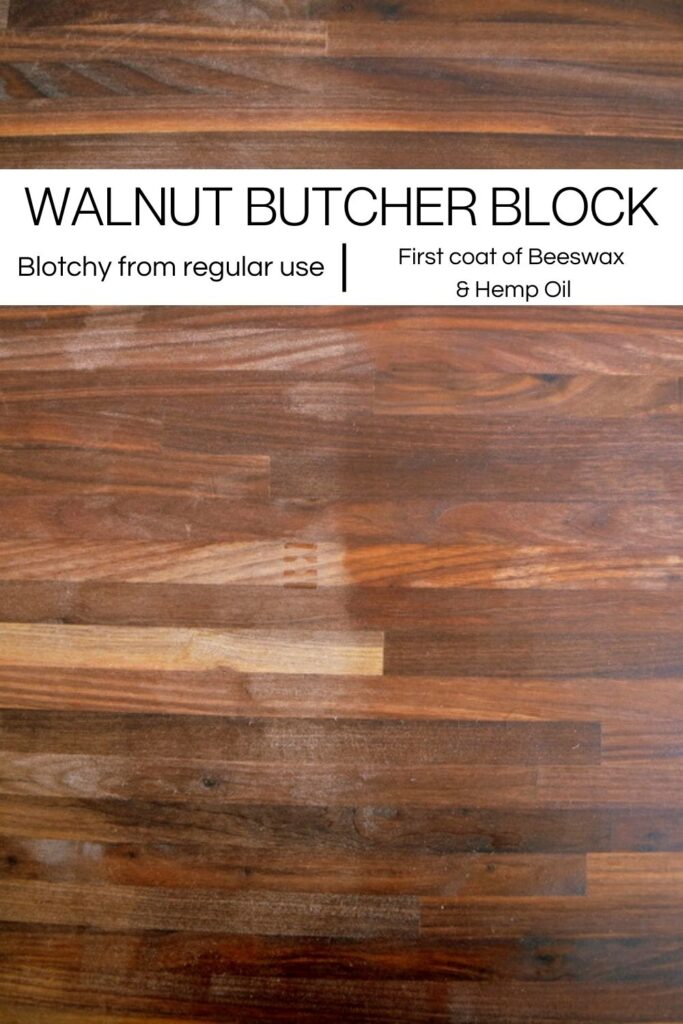
How to Make a Butcher Block Countertop Food Safe – Hardwood
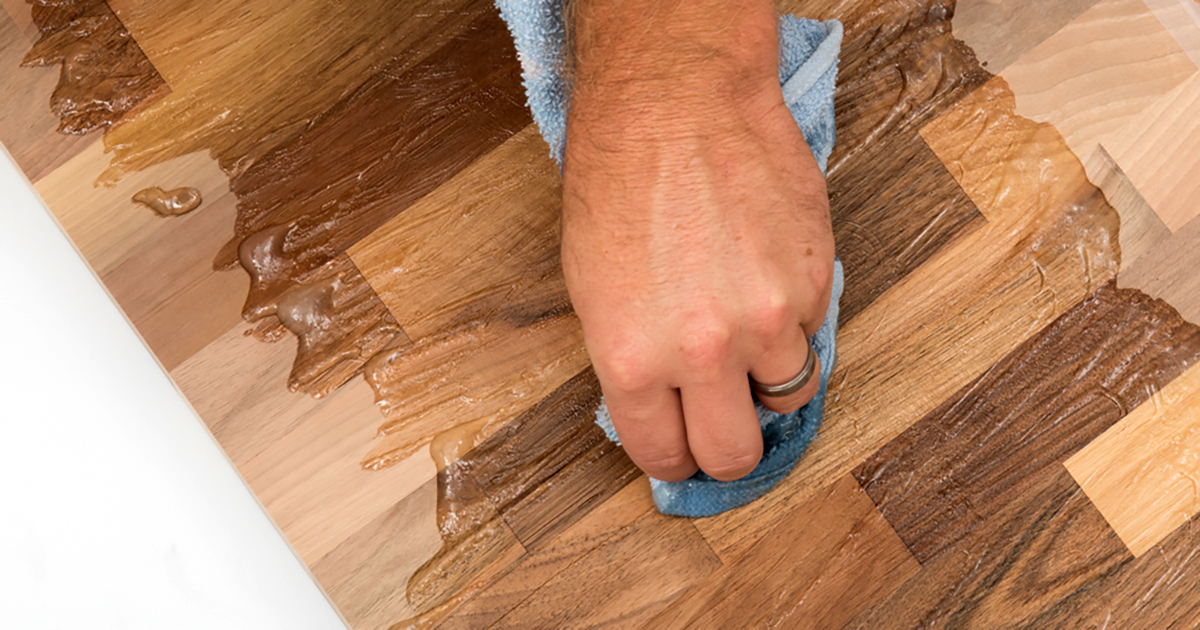
My Butcher Block Countertops, Two Years Later – Domestic Imperfection
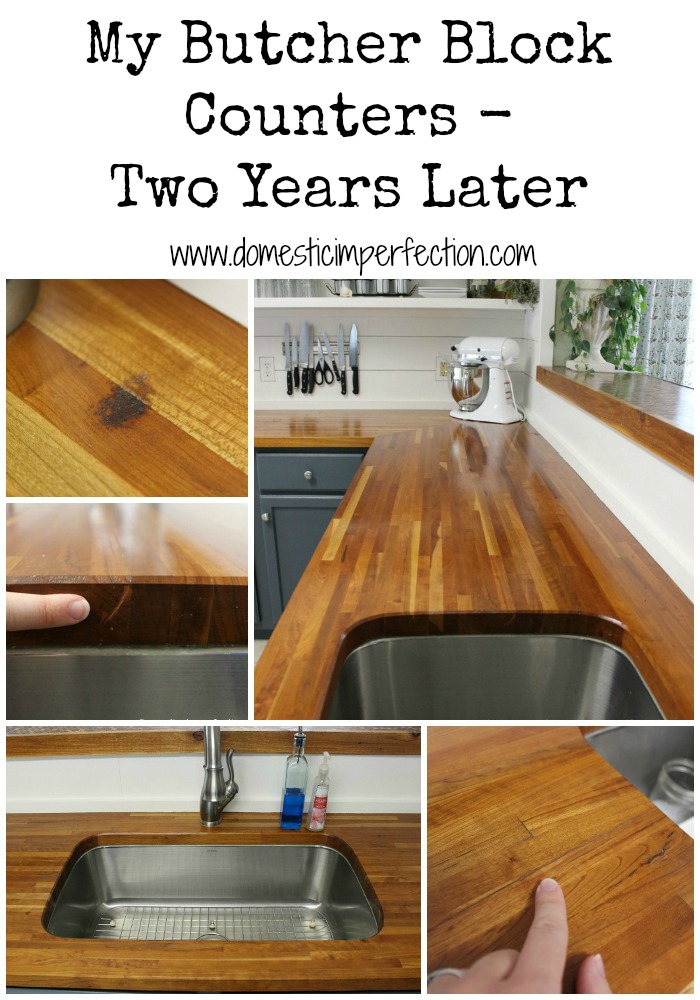
Related articles:
- Pine Butcher Block Countertops
- Butcher Block Countertops Walnut
- Maple Butcher Block Countertops
- Care Of Butcher Block Countertop
- Butcher Block Countertops Maintenance
- Antique Butcher Block Countertops
- Butcher Block Countertop Sealing
- Wood Butcher Block Countertop
- Thick Butcher Block Countertop
- How To Finish A Butcher Block Countertop
